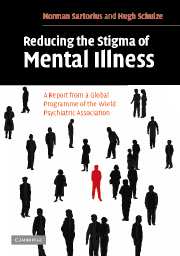Appendix II
Published online by Cambridge University Press: 15 August 2009
Summary
What are stigma, prejudice, and discrimination?
The word ‘stigma’ is of Greek origin and means ‘to pierce, to make a hole.’ The word was also used, however, to mean branding a criminal with a hot iron to mark infamy. In the Anatomy of Melancholy, Burton spoke of being ‘stigmatized with hot iron.’ It was in the late middle ages that the word came to mean the public defaming and branding of a criminal so that all could recognize him. Other meanings of the word, in particular with reference to stigmata (wounds similar to those of Christ indicating that a person has lived a life of extraordinary sanctity), have gradually disappeared. In more recent years, stigma has been used especially to indicate that certain diagnoses (e.g. tuberculosis, cancer and mental illness) awaken prejudice against persons so diagnosed.
Prejudice is an attitude reflecting the readiness of people to act in a positive or negative way towards the object of the prejudice without examining whether there is any justification for such behaviour. There are numerous prerequisites for prejudice to develop. Several of the most important are:
Recognition of the object of prejudice: for example, prejudice is awakened once the individual admits that he has a mental disorder or when extra pyramidal side-effects make it clear to others that he has been receiving anti-psychotic medication.
[…]
- Type
- Chapter
- Information
- Reducing the Stigma of Mental IllnessA Report from a Global Association, pp. 215 - 222Publisher: Cambridge University PressPrint publication year: 2005



